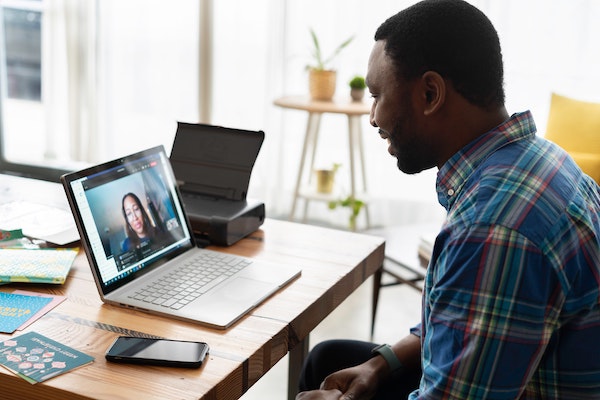Agoraphobia, characterized by a fear of places and situations that might cause panic or embarrassment, can make the world outside feel intimidating and overwhelming. For many, stepping out into a crowded area, or sometimes even just beyond their front door, can be daunting. This is where the wonders of modern technology step in. Online therapy has emerged as a beacon of hope for those grappling with agoraphobia. This blog will delve into the benefits, considerations, and how to choose the right online therapist for agoraphobia.
Contents
Understanding Agoraphobia
 Agoraphobia is a complex anxiety disorder characterized by an intense fear of being in situations where escape might be challenging or where help might not be available should things go wrong. This fear extends beyond the commonly misconceived “fear of open spaces,” encompassing the dread of public transportation, open or enclosed places, crowds, or even being alone outside one’s comfort zone.
Agoraphobia is a complex anxiety disorder characterized by an intense fear of being in situations where escape might be challenging or where help might not be available should things go wrong. This fear extends beyond the commonly misconceived “fear of open spaces,” encompassing the dread of public transportation, open or enclosed places, crowds, or even being alone outside one’s comfort zone.
Individuals with agoraphobia may experience panic attacks, and anticipatory anxiety, and often go to great lengths to avoid triggering situations, with some becoming housebound. The exact cause remains elusive but may involve past traumas, brain chemistry, genetics, personality traits, and chronic stress.
Can An Online Therapist Help With Agoraphobia?
Absolutely. Online therapy can be particularly beneficial for individuals with agoraphobia for several reasons:
- Convenience and Safety
People with agoraphobia often experience anxiety or fear about leaving their homes or entering certain environments. Online therapy allows them to receive professional help in a familiar and safe setting—usually their own home—without the stress of traveling to a therapist’s office.
- Access to Specialists
Agoraphobia may require specialized therapeutic techniques. Online platforms can give patients access to therapists who specialize in anxiety disorders, even if these experts aren’t available locally.
- Flexibility
Online sessions can be scheduled at convenient times. And there’s no need to factor in travel time. This can make therapy more accessible and less daunting.
- Consistency
For those with severe agoraphobia, consistent therapy is essential for progress. Online sessions can ensure that therapy isn’t skipped due to the fear of leaving home.
- Digital Tools and Resources
Many online therapy platforms offer additional resources such as worksheets, modules, and tracking tools that can complement the therapeutic process.
However, while online therapy has numerous benefits, it might not be suitable for everyone. Some individuals may prefer or benefit more from face-to-face interactions. Technical issues, like poor internet connections, can also interfere with online sessions. Therefore, it’s essential to weigh the pros and cons and discuss any concerns with a healthcare professional.
How Is Online Session For Agoraphobia Conducted?
 Online therapy sessions for agoraphobia are conducted similarly to traditional therapy sessions but utilize digital tools and platforms. Here’s a breakdown of how such sessions are typically conducted:
Online therapy sessions for agoraphobia are conducted similarly to traditional therapy sessions but utilize digital tools and platforms. Here’s a breakdown of how such sessions are typically conducted:
- Initial Assessment: The first session usually involves an in-depth assessment. The therapist will ask about the patient’s history, the onset of agoraphobia, associated symptoms, any past treatments, and specific goals for therapy. This helps the therapist tailor a treatment plan suited to the individual’s needs.
- Secure Platforms: Therapy sessions are held via secure video conferencing platforms that ensure privacy and confidentiality. These platforms are often specialized for therapy, ensuring high-quality audio and video.
- Structured Sessions: Sessions are typically structured and last for a predetermined time, usually around 50 minutes to an hour. The therapist will utilize evidence-based therapeutic approaches suitable for agoraphobia.
- Homework and Tasks: Often, the therapist will provide “homework” or tasks for the patient to complete between sessions. For agoraphobia, this might include graded exposure exercises, journaling feelings, or practicing specific coping strategies.
- Interactive Tools: Some online platforms offer interactive tools, such as chat features, worksheets, mood tracking, or modules that help patients understand and manage their symptoms.
- Feedback and Progress Monitoring: Regular feedback is essential. Therapists will monitor progress, adjust treatment strategies as needed, and ensure that the patient feels supported throughout the process.
It’s essential for individuals considering online therapy for agoraphobia to ensure that the chosen platform and therapist are credible. Checking for licenses, certifications, and client reviews can provide insights into the therapist’s qualifications and effectiveness.
What Techniques Are Used By An Online Therapist For Agoraphobia?
Online therapists employ a range of techniques to treat agoraphobia. These methods mirror those used in traditional face-to-face therapy but are adapted to fit the virtual environment. Here are some common techniques used by online therapists for agoraphobia:
Cognitive Behavioral Therapy (CBT)
CBT focuses on identifying and challenging irrational fears and beliefs that perpetuate anxiety. By dissecting these negative thought patterns, therapists assist patients in reframing their thoughts and beliefs to be more aligned with reality. For example, if a patient believes, “If I go outside, I’ll surely have a panic attack,” the therapist may help them explore this belief’s basis and work to challenge and change it.
Exposure Therapy
With graded exposure, patients begin with less anxiety-inducing scenarios and gradually progress to more challenging situations, all while being supported by their therapist. In an online setting, virtual exposure can be particularly beneficial. Therapists might use videos, images, or virtual reality tools to simulate situations that patients fear, helping them acclimate to these situations in a controlled environment before they face them in real life.
Relaxation Techniques
Managing the physiological symptoms of anxiety is crucial for those with agoraphobia. Online therapists often guide patients through various relaxation techniques like deep breathing exercises, progressive muscle relaxation, and meditation. These techniques are designed to calm the nervous system, reduce muscle tension, and provide patients with tangible tools to combat acute anxiety or panic attacks.
Acceptance and Commitment Therapy (ACT)
ACT is an action-oriented approach that emphasizes accepting one’s emotions and committing to actions that align with personal values. For someone with agoraphobia, this might mean acknowledging their fear while also taking steps to regain control over their life. ACT helps individuals recognize that avoidance isn’t the only way to manage fear and that meaningful actions can be taken even in the presence of discomfort.
Mindfulness and Grounding Techniques
 Being present and centered is vital when combatting feelings of panic and anxiety. Mindfulness practices encourage patients to observe their feelings without judgment, and grounding exercises like the “5-4-3-2-1” technique can help individuals anchor themselves during moments of intense anxiety. These practices can be particularly beneficial in breaking the cycle of escalating panic.
Being present and centered is vital when combatting feelings of panic and anxiety. Mindfulness practices encourage patients to observe their feelings without judgment, and grounding exercises like the “5-4-3-2-1” technique can help individuals anchor themselves during moments of intense anxiety. These practices can be particularly beneficial in breaking the cycle of escalating panic.
Psychoeducation
Knowledge is power. By educating patients about agoraphobia—its causes, symptoms, and management strategies—therapists empower them to better understand and confront their condition. An informed patient is better equipped to participate actively in their treatment and apply coping strategies effectively.
Medication Consultation
Although online therapists typically cannot prescribe medications, they can provide insights into potential medicinal treatments for agoraphobia. If they believe medication might benefit a patient, they can recommend consultation with a psychiatrist or primary care provider.
Support Groups and Group Therapy
The feeling of being understood and supported is invaluable. Virtual group therapy sessions or support groups offer patients a platform to share experiences, challenges, and coping strategies with others who understand their journey.
Biofeedback and Neurofeedback
These techniques involve providing real-time data about physiological functions to help patients gain control over them. While more complex in an online setting, emerging digital tools and wearables can offer insights into heart rate, muscle tension, and other physiological responses to stress, enabling patients to understand and manage their reactions better.
In treating agoraphobia, a multi-faceted and tailored approach ensures that therapeutic interventions address the unique nuances of each individual’s experience.
How Do I Find An Online Therapist For Agoraphobia?
 Finding an online therapist for agoraphobia involves careful research and consideration of your unique needs. Here’s a step-by-step guide to help you in this process:
Finding an online therapist for agoraphobia involves careful research and consideration of your unique needs. Here’s a step-by-step guide to help you in this process:
Determine Your Needs
Assess the severity of your agoraphobia and any other coexisting conditions you might have. Decide if you have a preference for the therapist’s background, such as gender, specialization, or theoretical approach.
Research Platforms
There are several online therapy platforms like TherapyMantra, MantraCare, and many others. Explore these platforms, looking into their offerings, pricing, and the credentials of therapists who specialize in anxiety disorders or agoraphobia.
Check Credentials
Ensure that the therapist you’re considering is licensed in your state or country. Licensing ensures that the therapist has undergone requisite training and adheres to professional standards. Some therapists may also have additional certifications in treating anxiety disorders, which can be a plus.
Read Reviews
Many platforms allow clients to leave reviews or ratings. This can provide insights into others’ experiences with particular therapists.
Consider Cost
Online therapy may vary in cost. Determine your budget and check if the platforms offer any sliding-scale fees, packages, or financial assistance. Some insurance plans might cover online therapy, so it’s worthwhile to check with your provider.
Initial Consultation
Many therapists offer a free initial consultation. This allows you to ask questions, get a feel for the therapist’s style, and determine if it’s a good fit.
Technical Considerations
Ensure you have a reliable internet connection, a suitable device for video calls, and a quiet, private space for sessions. Familiarize yourself with the platform’s interface, ensuring you’re comfortable with its functionality.
Ask Questions
During your initial sessions, don’t hesitate to ask the therapist about their experience with agoraphobia, their therapeutic approach, and what you can expect from therapy.
Stay Open to Change
If, after a few sessions, you feel the fit isn’t right, it’s okay to switch therapists. The therapeutic relationship is crucial, and it’s essential to find someone you trust and feel comfortable with.
Seek Recommendations
Sometimes, personal recommendations can be helpful. If you know someone who has undergone online therapy or if there are trusted professionals in your life, they might be able to recommend reputable platforms or therapists.
Remember, the goal is to find a therapist with whom you feel comfortable and safe, someone who understands your concerns and can guide you on your journey to manage and overcome agoraphobia.
Conclusion
Finding the right online therapist for agoraphobia can be a transformative step toward reclaiming control over one’s life. With the digital age offering an abundance of platforms and professionals, it’s crucial to conduct thorough research, prioritize one’s unique needs, and ensure the chosen therapist aligns with personal preferences and therapeutic goals.
By harnessing the power of virtual therapy, those battling agoraphobia can access invaluable support, tools, and strategies. Online therapists are increasingly important in today’s world because they provide a convenient and accessible way for people to receive mental health support and treatment. Visit TherapyMantra for affordable Online Therapy: Book a trial Online therapy session


